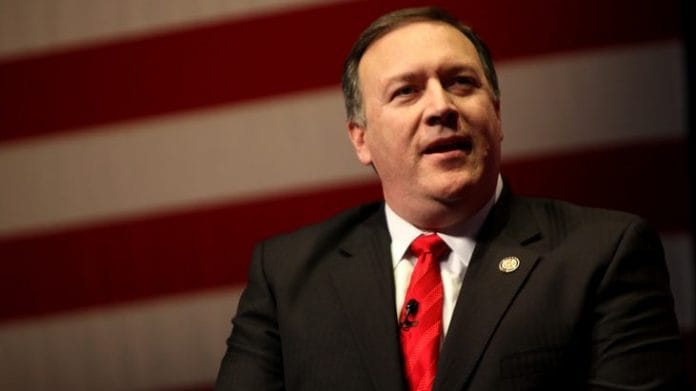Washington: Secretary of State Michael Pompeo played down Iraqi demands to expel U.S. troops, saying the country’s leaders have “privately” told him in repeated phone calls that they want U.S. troops to stay, despite their public pronouncements to the contrary.
Pompeo said Monday that he’s had some 50 phone calls with Sunni, Shiite and Kurdish leaders in Iraq in the days since a U.S. drone strike killed Iranian General Qassem Soleimani in Baghdad, and suggested the public outcry from the country’s parliament and senior leadership wasn’t genuine.
“They won’t all say so publicly, but privately they all welcome the fact that America is still there executing its counter-terror campaign, making sure that Daesh-ISIS doesn’t re-emerge in-theater and providing an opportunity for the Iraqis to gain the sovereignty and independence that most Iraqis want,” Pompeo said at an event at the Hoover Institution at Stanford University in California.
Pompeo made the remarks after a student asked whether Soleimani — the leader of the elite Quds Force who directed Iranian efforts in conflicts from Syria to Yemen — would achieve in death what he never achieved in life: the departure of the roughly 5,000 U.S. troops currently in Iraq. American forces arrived there in 2003 as part of the effort to oust Saddam Hussein.
Iraqi lawmakers decried what they said was a violation of their sovereignty and demanded U.S. troops leave following Soleimani’s killing on Jan. 3. Prime Minister Adel Abdul Mahdi then asked Pompeo to send officials to the country to work out a mechanism for the withdrawal, his office said last week. Pompeo’s spokeswoman Morgan Ortagus rejected that idea, saying the U.S. wouldn’t discuss a troop withdrawal. A later statement said the U.S. would discuss “force posture” in the country.
President Donald Trump has threatened to impose sanctions on Iraq and demand reimbursement for investments made in the country over the past two decades if the government insists on U.S. forces departing.
The United States has paid Iraq Billions of Dollars a year, for many years. That is on top of all else we have done for them. The people of Iraq don’t want to be dominated & controlled by Iran, but ultimately, that is their choice. Over the last 15 years, Iran has gained more….
— Donald J. Trump (@realDonaldTrump) January 3, 2020
“If they do ask us to leave, if we don’t do it in a very friendly basis, we will charge them sanctions like they’ve never seen before ever,” Trump told reporters last week. “It’ll make Iranian sanctions look somewhat tame.”
Pompeo’s remarks Monday followed a speech in which he argued that the decision to kill Soleimani — along with U.S. actions against Russia, China and globally — were part of a broader administration push to restore effective deterrence against U.S. adversaries. He accused past administrations, Republican and Democratic alike, of allowing Iran to expand its malign influence in the Middle East.
“Past laxity had emboldened them,” he said of Iran’s government. “We changed the calculus for them.”
The top U.S. diplomat framed the Soleimani killing in that light, arguing that it “imposed costs” on Iran after proxies under Tehran’s control fired rockets at a base near Kirkuk and killed an American contractor in late December.
The remarks were notable because Pompeo didn’t immediately mention what Trump and other top officials had argued was the reason for the killing: an imminent threat on U.S. lives or interests. Trump had said on Jan. 10 that Iran was “probably” targeting four U.S. embassies.
Defense Secretary Mark Esper later equivocated on that claim, telling CBS’s “Face the Nation” on Jan. 12 that he hadn’t seen specific evidence regarding four embassies. He said there were threats to “multiple embassies.”
Asked later Monday about the threat, Pompeo said the evidence of an imminent attack was “unmistakable” and the U.S. would have been negligent if it hadn’t acted. For the first time, Pompeo publicly confirmed that he had recommended at the time that the U.S. kill Soleimani.
Pompeo is on a three-day visit to California. Following a speech to the Commonwealth Club in San Francisco on Monday afternoon, the secretary of state will dine with tech leaders including Oracle Corp.’s Larry Ellison, venture capitalist Marc Andreessen and Sarah Friar, the chief executive officer of Nextdoor.com Inc.
Also read: Why the US is kinder to Modi unlike China’s Xi over protest crackdown






